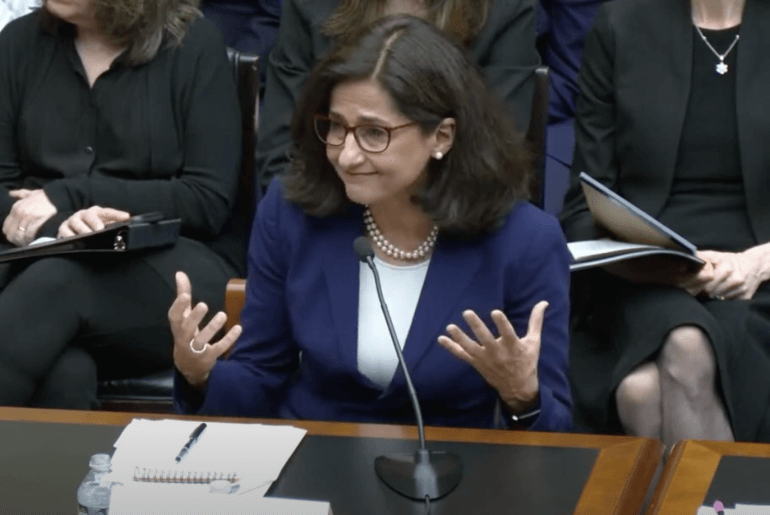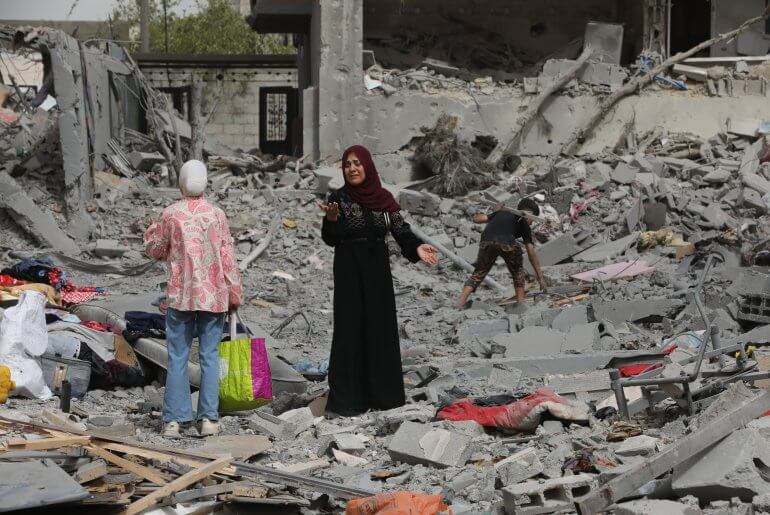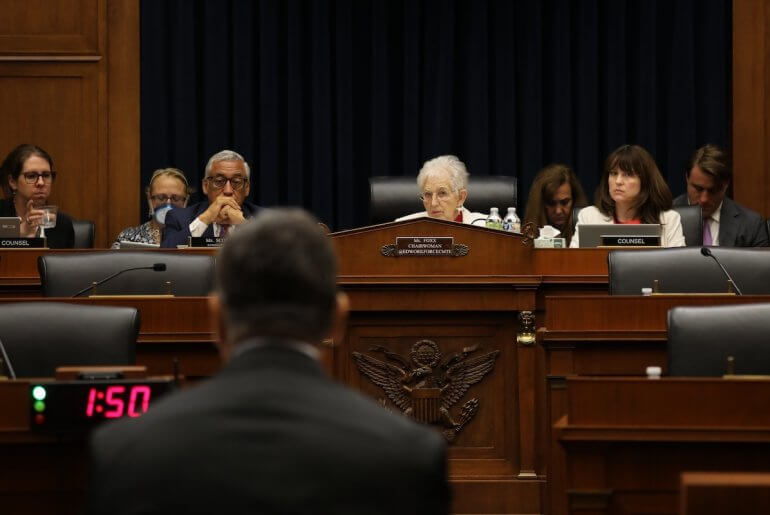Just past the Za’atara military checkpoint, south of Nablus, is the the entrance to the town of Beita. It’s unassuming, much like the town itself, which is nestled between the hilltops of the northern occupied West Bank.
Lined with warehouses storing the town’s produce exports, stone mason factories, and the odd blacksmith workshop, the entrance to the town is quiet, modest.
A closer look reveals the ashes of burnt tires, tear gas canisters, and rocks littering the street — remnants of the protests that have consumed this small village for the past four months.
Since May, the people of the town have staged daily protests against the establishment of an illegal Israeli settlement outpost on Jabal Sabih, or Mount Sabih, one of the largest land masses in Beita.
Israeli forces have violently suppressed the demonstrations, causing thousands of injuries, and killing seven Palestinians — six residents of Beita, including two children, and one resident of the nearby town of Yatma.
Just a few kilometers down Beita’s main road, is the ‘Martyr’s Square’, a memorial in the town’s center commemorating all of its residents who have been killed by Israel since the occupation of the West Bank in 1967.
Over the past month, two more names, Shadi al-Sharafa and Emad Dweikat, were added to the large stone memorial in the town, once again devastating the residents of Beita.
“For more than 100 days we have been resisting against the occupation and the settlers,” Abed al-Fattah Hamayel, a local activist in Beita, told Mondoweiss. “And everyday the situation is becoming even more volatile.”
“Everyday we are on standby, just waiting for someone to be killed or to be critically injured,” he said. “You can see how dangerous the situation is with the way the last two martyrs were killed.”
“The soldiers are just waiting for any excuse, or just the right moment to kill anyone.”
Killed for doing his job
On the night of July 27th, Shadi al-Sharafa, 41, got a call from some residents of Beita, who notified him that the water to the village had been cut off.
Al-Sharafa was the retired chief water engineer of Beita’s municipality, and though he wasn’t officially working anymore, he often responded to such calls from his neighbors and former colleagues.
And so, armed with a wrench and some other tools, al-Sharafa left his home and set off in the dark for the main water line in the village, located just off the main road, a few hundred meters from the entrance to Beita.
But before al-Sharafa could tend to the water lines, he was gunned down by Israeli soldiers, who were stationed near the town’s entrance.
“Some of the neighbors who live close by heard the shots and they ran down to the scene,” Qais al-Sharafa, 25, Shadi’s younger brother told Mondoweiss. “When they arrived, they found Shadi lying in a pool of blood, with his tools and pack of cigarettes lying next to him.”
The Israeli army claimed in a statement after the shooting that while their soldiers were “on routine duty,” they “ “spotted a Palestinian suspect in the area.”
“When the Palestinian began advancing rapidly towards the troop with a suspicious object identified as an iron bar in his hand, the troop operated to stop the suspect following the standard procedures, including by firing warning shots into the air,” the statement said.
“When the suspect continued advancing, the commander of the troop fired towards the suspect. The incident will be investigated,” it said.
Accounts from neighbors and other witnesses to the shooting, however, dispute the army’s account of the events, arguing that no warning shots were fired in the air, and that al-Sharafa was “shot in cold blood.”
“People who lived close to the area said they just heard one quick series of shots, but no warning shots before the shots that they fired at Shadi,” Qais told Mondoweiss.
Locals also refuted the implication made by the army that al-Sharafa was attempting to attack the soldiers (i.e. “advancing rapidly towards the soldiers”) saying that he was simply going to fix the water main, which happened to be in the area where the soldiers were.
“Shadi worked for the municipality for 17 years, and he would always go to that area to fix any problems. He used to go at all hours of the day and night,” Hamayel told Mondoweiss. “So it was very normal for him to be in that area at the time he was, and holding a crowbar.”
“He was going to do his job, which was giving water to the people of Beita. And he was killed for it, it’s as simple as that,” Hamayel said.
‘What they did was a war crime’
After al-Sharafa was shot, and residents of Beita began to gather at the scene, Israeli forces cordoned off the area and prevented anyone from approaching al-Sharafa’s body.
“They kept him for more than 30 minutes, lying there before an Israeli ambulance came,” Qais recounted, telling Mondoweiss that he had rushed to the scene upon hearing the news that his brother had been shot.
“The soldiers who were there in the area did not provide him with any first aid, and they didn’t let any of us or the Palestinian medics help him. They just left him lying there, bleeding out,” he said.
Once the Israeli ambulance arrived, Israeli forces loaded al-Sharafa’s body into the ambulance, and took him away, without notifying his family where he was being taken.
“A few hours later we got the call that he was dead,” Qais said, describing that phone call as the worst moment in his life.
The family’s nightmare didn’t end there.
“The next day we were waiting for his body to be returned for the funeral, when we were notified by the Palestinian authorities that the Israelis were holding his body and refusing to give it back,” he said.

The policy of withholding the bodies of slain Palestinians is common practice for Israeli authorities in cases when the slain Palestinian is accused of committing an attack against Israeli soldiers and/or civilians.
“Shadi was just going to do his work and he was killed. Holding his body and keeping it from us was just cruel,” Qais said.
The al-Sharafa family, including Shadi’s wife and four children, all of whom are under the age of 13, waited in agony for two weeks before his body was finally returned to Beita, and they were able to bury him in the town’s cemetery.
“Waiting for his body was torture for our family. We couldn’t do anything except wait,” Qais told Mondoweiss. “Your brother is dead and you can’t even give him a last goodbye, which is what he deserves, and what we need as a family.”
“After we buried him, it didn’t make us better, but at least we gave him his right after death, which was to rest in peace,” he said.
“My brother was just going to fix the water. In any other country he would be celebrated. But under occupation you can lose your life for just doing your job or trying to help people. They will kill you in cold blood.”
‘They kill us for defending our land’
Just days before the funeral of al-Sharafa, thousands of Beita’s residents gathered in the town’s square for another funeral procession. On Friday August 6th, during protests on Jabal Sabih, Israeli forces shot a number of protesters with live ammunition.
One of those protesters was Emad Dweikat, 37, a father of five young children and a resident of Beita. He was injured with multiple bullet wounds to the chest.
“We were sitting under an olive grove close to the protests when all of a sudden the soldiers just started firing live ammunition everywhere,” Ahmed Dweikat, 22, Emad’s nephew, told Mondoweiss.
“The soldiers didn’t differentiate between the young and old, who was throwing stones or not, they just shot at everyone,” Ahmed recounted.

According to Ahmed, his uncle’s wounds were critical. He said that when ambulances tried to evacuate Emad from Beita’s field hospital to the hospital in Nablus, Israeli forces shut down the surrounding roads and entrances and exits to the village.
“By the time we got around the roadblocks and took him to the hospital, it was too late,” Ahmed said.
Like al-Sharafa, Emad Dweikat is survived by his young children — four girls and a boy. Ahmed says the children are still in shock. “They can’t believe their dad is gone. None of us can.”

Ahmed said that the family won’t be filing any complaints with the Israeli authorities over his uncle’s killing, or calling for an investigation.
“We don’t care if there is an investigation or not. This is an occupation. There is an order from the government to kill Palestinians,” he said. “We won’t go to file a complaint, because we know where the courts will take us: nowhere.”
“They don’t need a reason to shoot anyone,” he continued. “They kill us just for defending our land.”
Protests continue
In the wake of the killing of al-Sharafa and Dweikat, the Palestinians in Beita have continued daily protests on Jabal Sabih. Israeli forces have continued to violently suppress the protests, injuring dozens of protesters every day.
In late June, the Israeli government forged an agreement with the settlers at the Evyatar outpost, stipulating that the settlers would be evacuated, but the outpost itself would remain intact as a military base, and potentially a future Yeshiva school.
The residents of Beita wholeheartedly rejected the deal, and filed a petition to Israel’s supreme court against it. But earlier this month, the court dismissed the residents’ petition, saying that the government’s land survey was still ongoing, and that it was “impossible to determine yet what areas of the land, if any, are privately owned by Palestinians,” the Times of Israel reported.
But they maintain that they own the land, and have the papers to prove it. And until it’s returned to them, they will keep protesting.
“The presence of the settlers is not the only issue here,” Hamayel said. “We need to be able to access our land, work on it, and have it the way it was before the settlement was there.”
“So in order to achieve that, the soldiers and the caravans need to go,” he continued. “That is our goal for these protests, to return the land to its rightful owners.”




Breaking the Silence has published a new report on settler violence in the West Bank, extensively using soldiers testimonies:
https://www.breakingthesilence.org.il/inside/wp-content/uploads/2021/07/OnDuty-Testimonies-En.pdf
“Violence perpetrated by settlers is an inseparable part of daily life in the West Bank since its occupation in 1967. The motives of this violence are ideological, and its goals are strategic – the expropriation of land from Palestinians and the effective takeover of as much as possible of what many settlers consider to be the ‘Land of Israel,’ all of which is achieved through a sustained effort to intimidate the Palestinian residents of the West Bank. This widespread phenomenon has intensified significantly over recent years, a phenomenon made possible due to the absence of any significant attempt to enforce the law by the State of Israel’s various governmental bodies, ministries and agencies, most prominently the Israeli police and military.
This booklet presents testimonies by soldiers about violent actions perpetrated by settlers, and follows on from ‘The High Command,’ a testimony booklet that we published in 2017 about settler influence on IDF conduct in the West Bank. “
B’Tselem:
“While millions of people in Israel and the West Bank are under lockdown, state-backed settler violence continues unabated. Settlers are attacking Palestinian shepherds in pastureland and entering villages, attacking residents and destroying their property. Despite the coronavirus crisis, the escalated violence has continued in recent weeks.
A-Tuwani, Masafer Yatta: Settlers stone Palestinian home, injuring resident lightly in the head
On Saturday afternoon, 24 July 2021, settlers arrived with a military escort from the direction of the Givat Ma’on outpost and stoned the home of the Rab’i family in the village. One member of the family was injured lightly in the head and was treated on the spot by a Palestinian Red Crescent crew who were called to the village. Only after village residents gathered near the home and tried to fend off the settlers by throwing stones, did the soldiers drive them away while firing tear gas at the residents.
The residents of a-Tuwani, like other communities in the Masafer Yatta area, are repeatedly attacked by settlers and soldiers as part of Israel’s routine harassment of Palestinian communities in the South Hebron Hills, and in Masafer Yatta in particular, in its bid to expel them from their homes and area of residence.”
American tax payer money at work. These ARE State supported war crimes by terrorists (as labeled by the US State Department). So why are we supporting them?